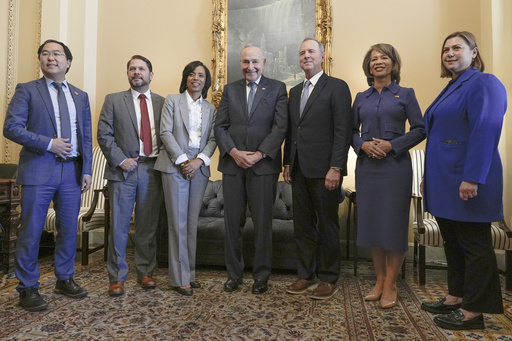
PHOENIX — According to Ruben Gallego, the incoming Democratic Senator from Arizona, fostering genuine connections with working-class voters is essential for the Democrats to regain influence in Washington. In reflecting on the recent election outcomes, where he outperformed other Democratic candidates in the state, Gallego emphasized his efforts in sharing his personal narrative and engaging with the electorate. This authentic communication resonated with voters, leading them to trust him as an advocate for their needs despite growing skepticism towards the Democratic Party overall.
Gallego shared that as constituents learned about his background—his experiences as a Marine veteran, a dedicated father, and a working-class individual who has achieved the American dream—they felt a sense of familiarity and trust. “When people started to see the challenges they faced, they recognized me as someone fighting on their behalf,” he stated. He won his Senate seat against Republican Kari Lake by a slim margin of 2.4 percentage points, contrasting with the 5.5-point deficit experienced by fellow Democrat Kamala Harris in her presidential bid in Arizona. This shift reveals nearly an 8-point swing that benefited the Democratic Senate race compared to the top of the ticket.
Gallego’s journey is one of resilience, having risen from a difficult upbringing where he was mainly raised by a single mother after his father was incarcerated for drug-related offenses. He juggled multiple jobs in high school to support his family and eventually gained admission to Harvard, serving in the Marines and participating in the Iraq War, where his unit faced tragic losses. His life story became a central theme of his campaign messaging, highlighting his struggles and determination.
While he believes that not all successful Democratic candidates need harrowing personal backgrounds, Gallego stressed the importance of personal connection with voters. “A successful candidate must connect with everyday individuals and convey a genuine commitment to fighting for them,” he remarked. He indicated that it’s essential for voters to perceive Democrats as advocates for the working class rather than the elite, and as supporters of small businesses over large corporations. “Returning to our economic roots and being recognized as champions for working families is crucial for us,” Gallego noted.
Data from AP VoteCast, a comprehensive survey involving over 4,000 Arizona voters, indicated that Gallego managed to win the support of Hispanic men against Lake, whereas the demographic was divided between Harris and Trump in the presidential election. In contrast to national trends where young men of varying backgrounds leaned towards Trump, they showed a more balanced response between Gallego and Lake in the Senate race.
Additionally, about 1 in 10 voters who backed Trump chose Gallego, while the crossover of Harris voters to Lake was minimal. Approximately 80% of Republican voters in Arizona supported both Trump and Lake, while nearly 90% of Democrats voted for both Harris and Gallego.
As Gallego concludes his tenure in the House and prepares to assume his Senate position in January—replacing Kyrsten Sinema, who switched from the Democratic Party to independent—he remains committed to maintaining party integrity. Although he has been a vocal critic of Sinema’s opposition to abolishing the Senate filibuster, Gallego mentioned he would not support any Republican efforts to eliminate the rule. “It’s not my responsibility to facilitate their agenda,” he commented, signaling his commitment to uphold Democratic principles in the Senate.
